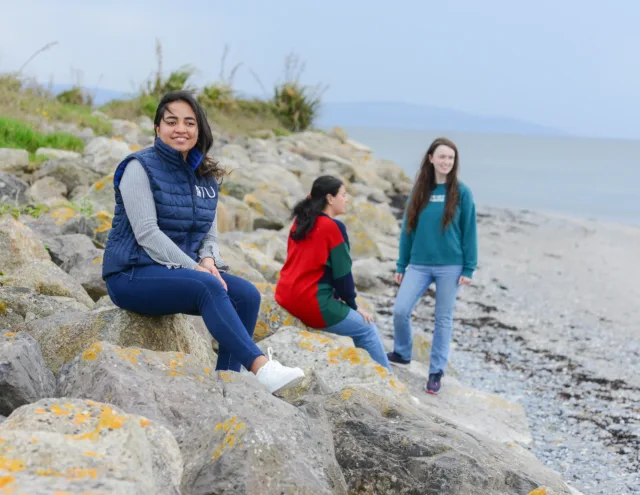View all Courses
Marine Spatial Planning
Postgraduate Certificate
Course Details
| Course Code | GA_SMSPG_S09 |
|---|---|
| Level | 9 |
| Credits | 40 |
| Method of Delivery | Online |
| Campus Locations | Galway City – Dublin Road |
| Mode of Delivery | Part Time |

Course Overview
The aim of this part time, online programme is to help prepare graduates for marine spatial planning roles and contribute to the sustainable development of Ireland’s blue economy.
This will be achieved by integrating graduates’ knowledge of marine systems with an understanding of the relevant economic, legislative, and policy contexts, coupled with technical skills related to the role of a marine spatial planning professional.
Course Details
Year 1
| Semester | Module Details | Credits | Mandatory / Elective |
|---|---|---|---|
| 1 |
Stakeholder Engagement for Marine Spatial PlanningStakeholder engagement is crucial to the development of public policy, decision-making, and business practice. Decision-making is improved when stakeholder engagement facilitates communications, broadens community support for projects, and garners new resources, data and ideas. It is therefore often employed to tackle complex multi-dimensional problems, such as those encountered in marine spatial planning. This course provides practical guidance on how to plan and conduct effective Stakeholder Engagement processes, with emphasis on issues related to marine spatial planning. Learning Outcomes 1. Identify stakeholders relevant to current and emerging marine spatial planning scenarios |
05 | Mandatory |
| 1 |
Marine Spatial AnalysisThis module will cover spatial analysis tools, and mapping software used for decision support in marine spatial planning. It will cover the integration, analysis, inference, and uncertainty associated with data and analyses, as well as tools for the storage, manipulation and display of spatial data. Learning Outcomes 1. Describe the underpinning theoretical concepts, and apply spatial analysis techniques |
10 | Mandatory |
| 1 |
Marine Policy and EconomicsThis module will present international, national, and regional frameworks related to the management and administration of marine resources. Environmental economics will be introduced and discussed using a case study approach. Special emphasis will be devoted to the economic analysis of natural resource exploitation of renewable and open-access resources. The course also addresses the social-ecological aspects of marine protected areas, strategies to manage, control and monitor marine protected areas and their relationship with end users. Learning Outcomes 1. Describe the application of mechanisms used to manage the marine environment and its resources |
05 | Mandatory |
| 2 |
Marine Spatial Planning: Current Advances and ChallengesCurrent issues and challenges associated with the implementation of marine spatial planning in Ireland and Europe. The module will be delivered through a series of guest lectures and workshops from industry practitioners involved in implementing and responding to MSP measures across various sectors including offshore renewable energy, fisheries, shipping, tourism, ports, aquaculture and conservation. Learning Outcomes 1. Describe the evolution of marine spatial planning frameworks within an EU and Irish context |
05 | Mandatory |
| 2 |
Marine Resource ManagementMarine resource management is the management of society's interactions with, and impacts on, the marine environment. Sustainable management involves managing economic, social and environmental systems. In this course, the ecosystem management principles involved in sustainable exploitation and conservation of marine environments and species are considered. A national, European, and global perspective is included, and underlying principles are demonstrated by reference to case studies. Learning Outcomes 1. Describe ecosystem based management for the sustainable exploitation and conservation of marine resources |
05 | Mandatory |
| 2 |
Marine Spatial Planning ProjectThis module is designed to offer learners the opportunity to combine the skills and knowledge developed during the programme. Where learners are in relevant employment, they will be mentored by programme staff to develop and conduct a case study in marine spatial planning. Where they are not in a relevant employment setting, they will work with programme staff in ATU to develop and conduct a marine spatial planning case study. Learning Outcomes 1. Identify, choose, and plan the delivery of a project topic |
10 | Mandatory |
Recommended Study Hours per week
Examination and Assessment
On-Campus Attendance Requirement
Note: Check programme Examination and Assessment requirements, as they may involve examinations to be taken on campus.
Download a prospectus
Entry Requirements
Candidates must hold a cognate level 8 Bachelor (Hons) degree with a minimum grade classification of H2.2 or equivalent. Cognate degrees for this programme include: marine science, marine biology, oceanography, marine ecology, geography, planning, economics, law, civil engineering.
Candidates who do not meet the H2.2 performance standard in a Level 8 award will be required to pass a qualifying assignment at a H2.2 performance standard as established by the Programme Board, and approved by the Registrar.
Further Information
Who Should Apply?
Persons working directly or indirectly on aspects of the marine environment.
Contact Information
Department of Natural Resources and the Environment
Ian O’Connor
Head of Department
E: Ian.oconnor@atu.ie
Natural Resources and the Environment


